 Advertising can be expensive, but at times it can also be an effective way to promote your book, especially if it reaches your target audience, and what is better than either a magazine (online or print) that reviews and focuses on new books. Advertising can be especially effective if your novel or book has just won an award or there’s something new to announce. So it’s definitely something to consider.  Book reviews are critical to your book’s success! I’m sure you’ve heard that, but it’s true for a number of reasons. Not only does your publisher want them to use as blurbs on the cover or for inside, but also for book promotion purposes. 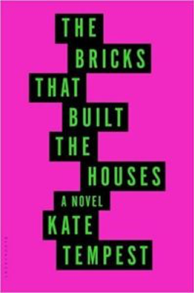 I love Kate Tempest’s name. I love her look, too, for its Joplin-esque qualities. And I especially love some of Tempest’s craftsmanship in her debut novel, The Bricks That Built the Houses. Tempest’s work is worth reading if only for the poetry of her writing and its so-called urban edginess. It’s also worth experiencing for a peek into the lives of England’s twenty-somethings, many of them as misguided and uncertain as America’s millennials. In the first seven pages, we meet Harry (female), Leon, and Becky, who are leaving town — perhaps running away? “They’re driving past the streets, the shops, the corners where they made themselves. 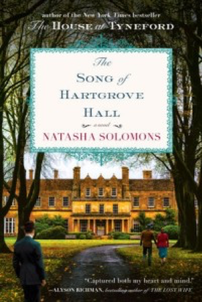 A complicated tale of sibling rivalry set against the backdrop of a once-grand English manor. This novel is the perfect mid-winter read, especially if you’re a “Downton Abbey” fan. Curled up in front of a fire, you won’t want to stop turning the pages once you begin, so time your read carefully. Bestselling author Natasha Solomons has delivered yet another enthralling tale that takes place in the English countryside, this time in and around Hartgrove Hall, a manor once beautiful and stately. After World War II, however, when the family reconvenes, the place is falling apart.  This winter has taught us Easterners, especially New Englanders, a lot about snow and about the very pleasurable peaceful feeling one gets as we watch the “snow falling on cedars,” barren trees and the landscape in general. For me, at least, it replaces the drab and dreary with a kind of heavenly beauty. And then when the blue sky and sun emerge, it’s like being kissed by your favorite grandparent and told to go play outside – sledding, skating, etc. 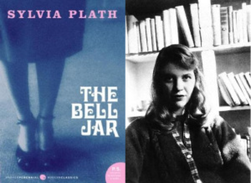 THE BELL JAR BY SYLVIA PLATH Favorite Line: "I knew that’s what marriage was like, because cook and clean and wash was just what Buddy Willard’s mother did from morning till night...and I knew in spite of all the roses and kisses and restaurant dinners a man showered on a woman before he married her, what he secretly wanted when the wedding service ended was for her to flatten out underneath his feet like Mrs. Willard’s kitchen mat"(85). The Bell Jar is something everyone, and especially every woman, needs to read. While Plath’s semi-autobiographical novel touches upon mental illness, it is truly the story of a young woman struggling to find her place in 1950’s America. Esther Greenwood is disenchanted with the confining expectations for women, yet simultaneously, she’s dangerously unsure of what path she wants her life to take. Women from any generation can empathize with Esther’s uncertainty, as well as the pressure she feels to succumb to the cult of domesticity. --Rachel Ehrenberg 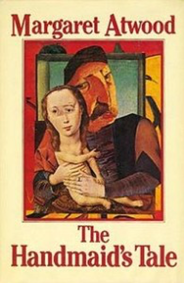 THE HANDMAID'S TALE BY MARGARET ATWOOD Favorite Line: "Don't let the bastards grind you down." While dystopian fiction is very much "in vogue" at the moment, Atwood pushes the genre past the more-recent post-apocalyptic plot lines, drawing on extreme religious beliefs to create a strange, misogynistic environment. In the world of Atwood's dystopia, written in 19XX, women cannot read, write, or do much else aside from bearing children. Their value comes from the quality of their ovaries. Births are experienced by all and insubordination is combatted with public hangings. It's horrifying in a way that The Hunger Games could never be because it doesn't seem that far-fetched. --Emily Holland 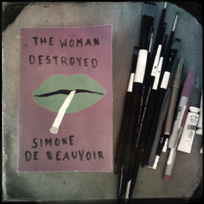 THE WOMAN DESTROYED BY SIMONE DE BEAUVOIR Favorite Line: "...me so vital alive a burning flame and him stuffy middle-class cold hearted prick like limp macaroni." Simone’s narrative draws upon the feminist theories in her famous philosophical text, The Second Sex. The Woman Destroyed is divided into three parts, each from the perspective of a woman experiencing troubles relating to age, her husband's mistress, the loss of passion, and other intertwined mostly female issues. The book not only depicts the lives of the three women, but also reveals their deepest thoughts with an honesty that, at times, is brutal to read. --Morgan Day 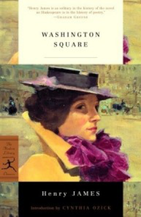 WASHINGTON SQUARE BY HENRY JAMES Favorite Line:“Poor Catherine's dignity was not aggressive; it never sat in state; but if you pushed far enough you could find it. Her father had pushed very far.” While Washington Squareis certainly not a feel-good, warm fuzzy read, it does leave the reader incredibly satisfied and vindicated. Catherine Sloper, initially the epitome of a Plain-Jane, is viewed as undesirable for marriage with the exception of her sizable trust fund. Morris Townsend, a slimy, opportunistic man views Catherine as a vulnerable target and begins to court her, much to the chagrin of her equally repugnant father. Both men attempt to use Catherine for their own ends, however they vastly underestimate her. Catherine is the most unlikely heroine, yet her small victories over the manipulative men in her life make her one of the most endearing protagonists. --Cherylann Pasha 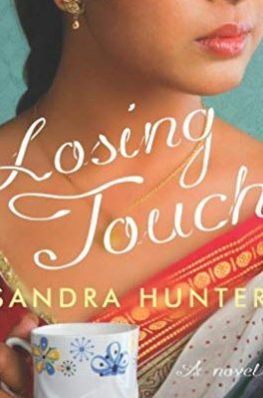 Losing Touch by Sandra Hunter Review by Herta Feely Much of what kept me turning the pages of Losing Touch was Sandra Hunter’s clever prose and deft touch in describing her various characters’ vulnerabilities, foibles, desires, and often awkward behaviors. Here is one such passage from character Sunila’s point-of-view (of her husband and daughter): “They are so alike…They even use their hands the same way when they speak. When they argue it’s like watching two mad, rival conductors swiping and slashing the air between them.” The story focused mostly on Arjun, father and husband, who I found by turns frustrating because of his selfish behavior, and then touching because of his unfulfilled desires and growing illness. Sandra’s keen insight into the life of immigrant families, in this case Indian, recently settled in a foreign country, England, leaves one pondering their plight, and how it affects each generation so differently. As an immigrant myself, I can relate to the complex emotions one experiences on being an outsider in a country that questions whether it wants you at all. I can hardly wait for Sandra Hunter’s next book. By Rachel Word
It’s funny how books sometimes “find you.” You are browsing the library for a new read and then one title just sticks out to you. For me, it was during my freshman year of college while studying creative writing at Susquehanna University that I found Gabriel Garcia Marquez’s books: or more accurately his books found me. I worked at the university library that first year. I didn’t have many desk shifts, and my main job was to put books that had been checked out back on the shelves. Not a lot of fun, but as a writing major and avid reader, it was one of the best opportunities to be introduced to new writers. The first of his books that “found me” was Marquez’s Love in the Time of Cholera. This book caught my attention because I had seen the movie starring Javier Bardem, Benjamin Bratt, and Giovanna Mezzogiorno several years ago. I had enjoyed the movie, so I decided to check out the book. Later that night when I settled into my bed, my pajama pants on, cozy under the covers, I opened the book and read the first line. It was inevitable: the scent of bitter almonds always reminded him of the fate of unrequited love. And I laughed out loud. Freshman year + unrequited love = the story of my life. I had a huge crush on a trombone player named Dave that I played in band with. He was a senior (i.e. way out of my league) and I told no one about how I felt. Marquez’s book had found me just at the right time. I experienced a wonderful catharsis as I was swept up in the whirlwind love triangle between Florentino, Fermina, and Urbino. Now that my interest in Marquez had been sparked, I started to learn more about him. He was born on March 6, 1928 in Aracataca, Colombia. When his parents moved away from the area, Marquez was taken in by his maternal grandparents. Marquez’s grandfather was affectionately known as the Colonel, because of his service in the Thousand Days War of Colombia, and had a large influence on Marquez’s upbringing. The Colonel was a liberal activist and well-known voice in the community. He was an avid storyteller and the one who ignited Marquez’s love for the written word by teaching him from the dictionary and taking him to circuses. After reading Love in the Time of Cholera, I was required to read Marquez’s short story “Very Old Man with Enormous Wings” for my Introduction to Fiction class. This story depicts the ordinary life of Elisenda and Pelayo, a couple living in a small, banal town, whose lives are radically changed when Pelayo finds an old man, wearing tattered rags, who happens to have huge, angel-like wings. Elisenda and Pelayo take him in and house him in their chicken coop. Instead of helping him, providing new clothes, food and a warm place to sleep, Elisenda starts charging visitors an admission fee for visitors to come gape at the old man. This very poignant image of an angelic creature being treated so poorly calls attention to the way that we all react when we see someone less fortunate. Think of when people turn their eyes away from homelessness or change the channel when a tragic news story begins. Marquez is challenging us to not turn our eyes away, and to address these problems head on in order to pioneer change. I realized the effect that this story had on me when I worked at a temp job in near Washington D.C. There were many homeless people in the area that I was working in and one man in particular always begged for money at the top of the escalator leading out of the metro. Before I read Marquez’s story, I would have done the same as my fellow commuters. I would have walked by without acknowledging him. However, because of my experience with “Very Old Man with Enormous Wings” I felt a deep and tangible empathy for that homeless man. I made sure to never dehumanize him. Marquez’s beautiful, eloquent novels challenge us to recognize the most valuable parts of life before our time runs out. Throughout his whole life, he urged his readers to bring love to the world. As he writes in Love in the Time of Cholera, “The only regret I will have in dying is if it is not for love.” When Gabriel Garcia Marquez died on April 17, 2014, the writing world experienced a huge loss. Marquez won numerous awards throughout his career, including the 1972 Neustadt International Prize for Literature and the 1982 Nobel Prize in Literature, and moreover he inspired young and old readers alike to treat each other with dignity and respect. We all have bad habits. Some people bite their nails, some leave dirty dishes in the sink, and some forget to foreshadow significant events in their novels.
Of course, we all have ways of coping and working to better ourselves, right? The dirty dishes can just start going into the dishwasher. People can start chewing toothpicks rather than their fingernails. Novelists can what? If you've ever felt simply stumped as to how to begin catching yourself at your own game when it comes to writing, here are a few helpful tips:
What are your favorite writing tips? What advice has made all the difference to you in your writing life? Contributed by K.C. Mead, Editorial Assistant, Chrysalis Editorial It is true that today more and more authors are jumping on the self-publishing train. However, there remains a vast body of writers out there still longing to attract the attention of the Big Six or land a deal with one of the many smaller presses out there. After all, there's just something especially delicious about knowing you've made it through the traditional filtration system, to have someone choose your work among all the other lovely shells along the shoreline.
Writer's Relief agrees, most of the authors who come to them for aid or advice dream of being among the small percentage of authors who publish their book with traditional publishing houses, like Penguin, Random House, or Hachette. Of course, the question becomes, how do you go about achieving this? Well, Writer's Relief and I agree on this point as well—your best bet for success in this arena is to hire yourself a literary agent. Although it's certainly possible to find a home for your manuscript without the aid of an agent, there are plenty of publishing houses (the Big Six especially) who will not even accept a submission if it doesn't come from an agent. Beyond this, of course, is the simple fact that agents are good for a great deal more than simply garnering publisher interest. To quote from Writer's Relief, here are just a few reasons why an agent is a fantastic tool for writers, no matter what stage you're at in your career:
Thus, for those of us still dreaming of the day that Random House comes knocking on our door for our latest masterpiece, finding a good literary agent is a must-do! What have your experiences been? Do you have a literary agent? Do you want one? (Writer's Relief blog: http://www.writersrelief.com/blog/2009/03/top-reasons-to-query-agents-first/) Contributed by K.C. Mead, Editorial Assistant, Chrysalis Editorial |
Archives
May 2021
Categories |
Proudly powered by Weebly

 RSS Feed
RSS Feed